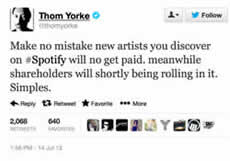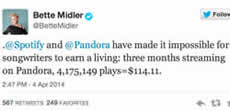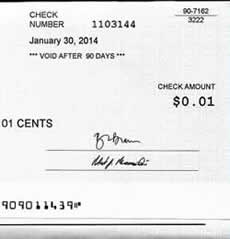USA PEOPLE SEARCH BY NAME!
- ❖ Current Address
- ❖ Phone Numbers
- ❖ Criminal Records
- ❖ Public Records
- ❖ Neighbors
- ❖ People's Age
- ❖ Property Ownership
- ❖ And Much More
Sun, 5 Oct 2014
Royalties From Streaming Music
There have been heated debates regarding online streaming services ever since musicians voiced out their disapproval of the technological advancement. Most music icons and even newcomers today have given their opinions on how streaming can sweep famous musicians into poverty.
One of the influential musicians who expressed his resistance to streaming services is Radiohead's and Atoms for Peace's member Thom Yorke who removed their albums from Spotify. This decision by the Radiohead frontman created outrage among fans who since then hailed Yorke as a snob and a rich hypocrite. For most musicians, the increasing interest for streaming services result to slim royalty rates and generates poor value to their music.
The music industry has faced an enormous transformation when record sales moved to online sales via iTunes ten years ago. Today, the industry is in the midst of another massive revolution as they shift to digital streaming services such as Spotify, Pandora, and YouTube. The main argument here is that, large portions of online sales go to the pockets of companies who own streaming services rather than the artists who produce the music.
No Songwriter Or Artist Will Be Able To Survive In The Future
Bette Midler posted on Twitter that she made $114.11 on 4,175,149 plays. Grammy-nominated composer and recording artist Armen Chakmakian jumped to television gigs after admitting that, because of streaming services and similar business practices, the companies earned more than the artists who hold rights to the music.
The former Shadowfax keyboardist made $4.20 from songwriting royalties and $11.50 from his recordings. Reports said that the minuscule earnings of artists from digital streaming services have caused alarm throughout the music industry.
The American musician, singer-songwriter, and multi-instrumentalist Beck says that "I can't pay the musicians I work with anymore, or the people producing or mastering my music. The model with royalties from streaming doesn't work".
The ABBA songwriters Bjorn Ulvaeus and Benny Andersson said it would today not be possible to write Abba songs and produce them with all the musicians, arrangers, the mixing engineer, and so forth in a world where Spotify is the main source of income. Great songwriting is not part of the recording process, it's a craft that demands serious investment in both money and time. The high quality produced songs are much fewer today. For many artists and record companies it cost too much to hire arrangers for strings, horns, studio musicians, producers, and so forth and that affects the quality.
Taylor Swift: "I'm not willing to contribute my life's work to an experiment that I don't feel fairly compensates the writers, producers, artists and creators of this music".
Several artists such as Rihanna, Katy Perry, Blondie, and Brian Wilson opposed to a bill introduced in September 2012 called the Internet Radio Fairness Act. The legislation was petitioned by Pandora to cut the royalties that Internet radio providers pay to artists. Even independent labels like the American Association of Independent Music disapproved this legislation seeing how this could affect the indie labels that they represent.
Spotify And Pandora Are Making $Billions On Other Peoples' Work
A handful of artists can make a living through royalties. The streaming services are showering with money. Pandora is operated publicly and it's valued at an estimated $2 billion. Spotify, which is obviously the more successful streaming provider now, isn't publicly traded but investors value it at $3 billion. Having the more effective structure that patterns that of the music industry during the 90s, analysts say that Spotify can really make it big in the years to come. This estimation led some industry people to believe that the future of music artists aren't looking good, unless you're already an established singer like Beyoncé or Lady Gaga. The notion that streaming can sweep famous musicians into poverty is more possible for newcomers.
Streaming is good for the listeners but not for the musicians. A music executive told Times that artists with solid income will only be the ones who will carry on as round-the-clock musicians once streaming takes over. But despite petitions such as the Internet Radio Fairness Act, a music lawyer once said that royal rates for streaming may increase sooner or later.
More to read:
Is Music Streaming a Threat to the Music Industry?
Spotify or iTunes? The Battle for Music Supremacy.
Spotify Is Making Tons Of Money On Other People's Work.




